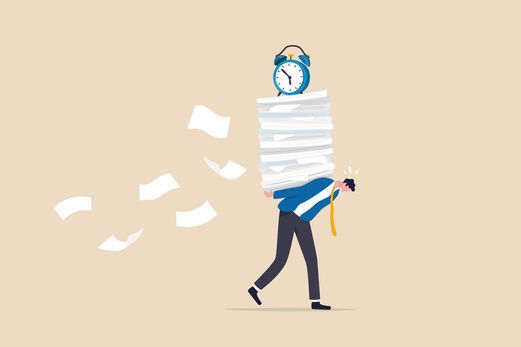
Unless you are Superman, working without resting or minding a positive work ethic is bad for you. The average employee in the average workplace wants to stand out and be recognized for a good job. But this common aspiration is not enough reason to overexert yourself.
This article is all about the indications that you are overloading yourself at work. Once you learn to recognize these symptoms, you should be able to break out of the cycle of the modern-day employee’s overkill attitude.
Why There are Overworked Employees
1. Corporate Competition
Corporate competition is the ultimate reason employees overexert themselves. In a world where this competition is vicious and slow-paced workers are cast aside, excess work can seem like the only way out. Thus, when you find yourself in a situation where your fellow employees are overdoing it, you would likely join them even if it puts a strain on your body and mind.
2. To Compensate for Low Pay
The most common work ethic is closely related to time. Rather than how effective an employee is, more favor is granted to how much time an employee can log at work. As a result, time becomes money and employers have no qualms paying you more if you are willing to dedicate more time to work.
3. Undecided or Unhealthy Career Goals
Whether or not employers pay for you for working overtime, ultimately, you decide to follow their expectations. Most of the time, the only reason you choose to go along with your employer’s wheedling is that you want to climb the ranks at your workplace with overtime. This is an unhealthy career goal. Ingenuity is more effective.
4. Overdependence on Technology
Technology has enabled employees to work from anywhere and at any time. Because of this, you may feel like you can be more productive working all the time instead of resting or going out to socialize. This seemingly smart decision only makes you more dependent on technology and work, gradually losing yourself to the workplace and letting it take over your time and thoughts.
Main Symptoms of Being Overworked
Given the factors previously identified, here are 10 signs that indicate you are overexerting yourself at work.
1. Uncontrollable Readiness to Work Overtime
Losing yourself to your work is the first sign you are overburdened. This sign is tricky because it can be mistaken for diligence and dedication. But if you can identify what the motivation for this diligence is, you can determine whether or not you are overtaxing yourself.
Diligence in the workplace is measured by how much you are willing to dedicate your duties at the workplace. But there is a limit to this dedication before it becomes something else. If it looks as if you have no choice on whether or not to work overtime, you are most likely overtaxing yourself or on the verge of doing so.
2. Brain Fog
The human mind and body together is a complex machine. With so many parts running at the same time, you can easily overlook one part acting a bit more slowly than normal. However, overlooking the mind has severe consequences. This is why when you overburden yourself with work, your mind pulls back a little and the result is brain fog.
Once you find that you occasionally have disjointed thoughts and it takes longer to remember something, you are most likely overdoing it at work. This is your mind informing you of the need to rest.
3. Constant Exhaustion
The easiest way to know that you are working overtime is constant physical exhaustion. When this exhaustion sets in, it does not just settle on your body. Instead, even your mind takes a hit. You feel weak all the time and it takes a lot of determination to sit with your back straight.
Granted, you can push your body past your normal limits to do more time. But frequently treating your body this way is simply setting yourself up for collapse. So, once your body starts to feel weaker and low on energy, you are most likely overexerting yourself with work.
4. Irritability
As we have explained, overtaxing yourself has as much effect on the body as it has on the mind. You know that your work has started to strain your mind when it is easily unsettled and can no longer relax.
The mind is the bedrock of a person’s attitude. When your mind is healthy and at peace, you typically have little to worry about and become happy easily. The reverse is also the case. When your mind is unhealthy and filled with all kinds of thoughts, you will find yourself losing control easily. This plays out in the form of irritability. Then you snap at everybody and are easily annoyed.
5. Increasing Distractions
In addition to irritability and anxiety, overtaxing yourself at work can also cause your mind to be easily distracted. Any other day, you would be able to focus on what you are doing. But once you have started to do overtime at work, your mind becomes a mess and will grasp at everything else apart from what you want to focus on.
Distractions can take a positive light. For example, your mind can give birth to more and better ideas about how you work. But the distractions that come from overworking yourself do not have this effect. Instead, they collapse the framework of constructive thinking and make you forget things easily.
6. Poor Sleep Patterns
Your sleep will also take a hit when you overtax yourself at work. The more time you spend working, the less time you have to sleep. So, when you find yourself with only 4 to 6 hours at most to sleep, you have most certainly overextended yourself at work.
However, more than the time you have to sleep, working overtime can mess up your body’s clock. Thus, you may find it more and more difficult to sleep or you would sleep at the oddest hours.
7. Declining Health
Given all the indications so far mentioned, working overtime chips away at your body and mind. The natural consequence of this weakening process is that your health begins to deteriorate. Furthermore, you become vulnerable to ailments and infections that your body is supposed to have built an immunity against.
Try to reduce how much time you spend working. Then check if eating and sleeping more regularly fixes your declining health. If none of these work, then you most certainly are still in the throes of working overtime.
8. Disappearing Social Life
If you are working overtime, your career and social life tend to run at odds with each other. The more committed you are to one, the less time and energy you would be willing to spend on the other. Consequently, a balanced work life is one that rests between your job and your social life. In view of this identified relationship between work life and social life, overloading yourself with work is the same as sacrificing your social life.
9. Waning Interests and Passion
Since your decision to spend more time at work tends to strain your mind, one of the natural consequences is that you begin to lose interest. Because you feed your mind with nothing other than work, very little space is left for much else. Although this takes a while to become noticeable, it is a difficult symptom of being overworked because it affects the work you are doing.
Waning interest in your work and losing the edge of your passion are convincing symptoms that you have taken on more than your mind is willing to chew. So, once you notice that you can no longer find pleasure in things that used to thrill you at your workplace, it is most likely because you are overextending yourself.
10. Decreasing Productivity
Reduced productivity is a common and serious symptom of being overworked. It is also the result of all of the factors earlier mentioned working together. Once your physical health begins to decline and your mind struggles more and more to grasp things, your productivity at work will plunge. Therefore, if your output at work is dropping constantly, you have most likely overextended yourself with work.
Simple Tips and Tricks to Maintain a Good Work Ethic
According to the WHO, working more than 55 hours a week can increase your chances of suffering a stroke or ischemic heart disease.
You can inculcate a more positive work ethic, one that allows you to remain productive without being overworked. The following are a few things you should consider doing:
- Restructure your motivation for work and include your physical and mental health in your considerations.
- Only do serious work between specific hours of the day, for example, 9 am to 12 pm, and 1 pm to 4 pm.
- Use automated time tracking tools like Traqq to ensure that you monitor how much time you spend doing anything, work or play.
- Take regular vacations where you socialize and stay away from the hustle and bustle of work.
- Watch out for the symptoms identified in this article and make sure that they never show up.

